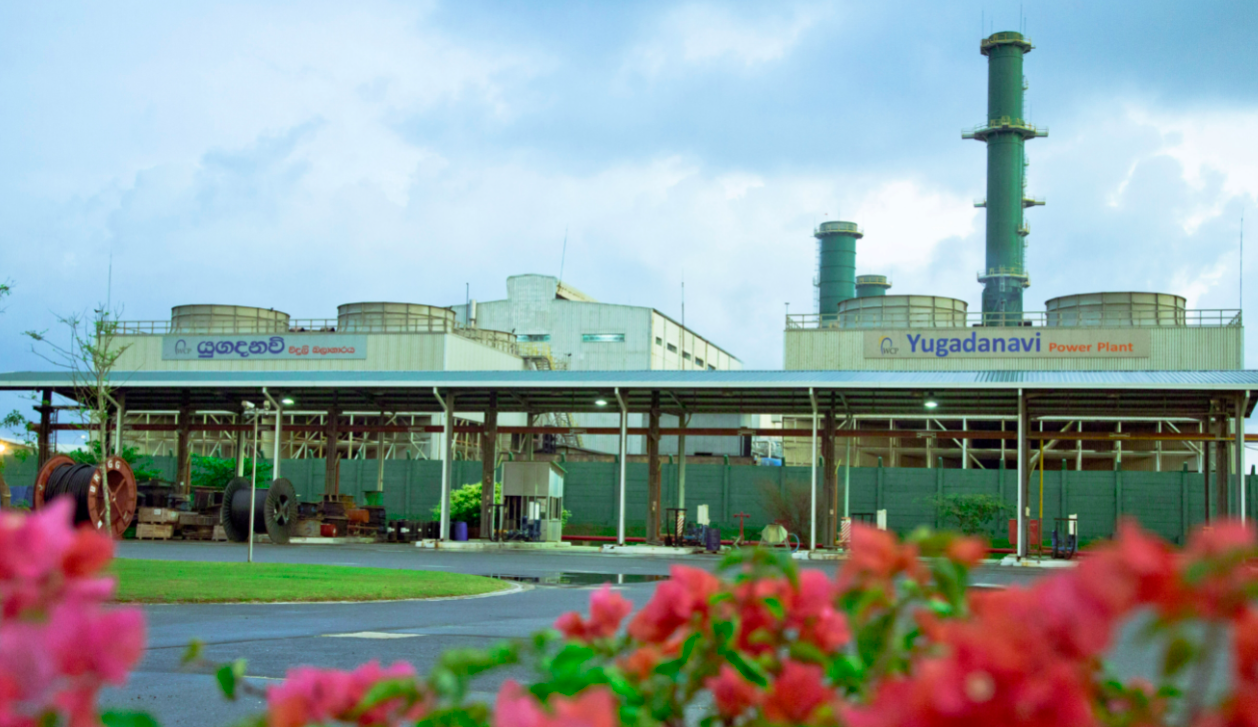Power, be it political or electric, and everything associated with it have to be handled carefully if shocks are to be averted. The incumbent government has failed to do so and is in deep trouble, as a result. Some of its politicians have, true to form, let power go to their heads, and are going berserk; State Minister Lohan Ratwatte is alleged to have recently barged into two prisons and held some Tamil inmates at gunpoint in one of them. They did so while they were in power previously, and caused their own downfall in 2015. Old habits are said to die hard.
This time around, the government is facing a huge crisis because of an electric power issue, or to be exact, the sale of shares of a power plant the wrong way. What it did unbeknownst to others came to light on Tuesday (21), when the US-based energy firm, New Fortress Energy Inc., announced, on its official website, that it had executed a definitive agreement with the Sri Lankan government for investment in West Coast Power Ltd., the owner of the 310 MW Yugadanavi Power Plant along with the rights to develop a new LNG terminal off the coast of Colombo. It has acquired 40% of the shares of West Coast Power Ltd.
Blowback
The Ceylon Electricity Board Engineers’ Union, the Professionals’ National Front (PNF), and a number of influential energy experts have deemed the New Fortress agreement detrimental to Sri Lanka’s interests mainly due to the exclusivity clauses in it and the fact that it does not come under the Sri Lankan law. The details of the agreement are not available, and it contains such clauses, the government should realize that there’ll be hell to pay.
The PNF doubts whether the government obtained the Attorney General’s opinion before signing what they call the misbegotten agreement. The protesting professionals are also concerned about Sri Lanka’s national grid becoming dependent on a single foreign company for the supply of LNG, which is expected to replace coal and even diesel used in power plants in years to come.
China has declared that it will stop building coal-fired power projects in the developing world. No less a person than Chinese President Xi Jinping recently told the United Nations General Assembly in a video recording: “China will step up support for other developing countries in developing green and low-carbon energy, and will not build new coal-fired power projects abroad.” Thus, there will not be any more additions to the Norochcholai coal-fired power plant. Most power plants in Sri Lanka will be converted to LNG, which is to be provided by New Fortress, according to the recently struck deal. Even the supporters of the PPPs (Public-Private Partnerships) are critical of the fact that the above-mentioned deal was struck without open tender, and the US company will monopolize the supply of LNG to power plants.
It is not immediately known whether Sri Lanka was under US pressure to enter into the New Fortress deal, or the agreement was inked in a hurry due to the government’s desperation for dollars, or someone received kickbacks from the deal. Whatever the reason may be, the government is in a spot, and even its coalition allies are up in arms against the controversial deal.
Mutiny on board?
Ten constituents of the ruling SLPP coalition have sought an appointment with President Gotabaya Rajapaksa to discuss the New Fortress agreement, which, they insist, is detrimental to Sri Lanka’s interests. Prominent among them are the Communist Party of Sri Lanka (CPSL), the Lanka Sama Samaja Party (LSSP), the Sri Lanka Freedom Party (SLFP), the National Freedom Front (NFF), the Pivithuru Hela Urumaya (PHU), the Democratic Left Front (DLF) and the Sri Lanka Mahajana Party. They have sent a three-page letter to the President, voicing their concerns about the deal in question, and asking for an audience. The signatories to the letter include SLFP leader and former President Maithripala Sirisena, NFF leader Wimal Weerawansa, DLF leader Vasudeva Nanayakkara, PHU leader Udaya Gammanpila, CPSL General Secretary Dr. G. Weerasinghe and SLPP leader Prof. Tissa Vithrana.
The leaders and the General Secretaries of the aforesaid parties have already registered their strong protest with the SLPP leadership against the power plant deal; they met Prime Minister Mahinda Rajapaksa and Finance Minister Basil Rajapaksa at Temple Trees on Thursday (24), but their discussion ended inconclusively. The PM and Basis did not provide definitive answers to any of the questions raised at the meeting, according to well-informed sources. This kind of prevarication is an indication that the government is not willing or in a position to withdraw from the New Fortress deal unlike in the case of the Colombo Port East Container Terminal agreement, which the government cancelled to the displeasure of India and Japan. It is said to be under US pressure to stick to the New Fortress agreement. It has antagonized the US by getting too close to China, and may not want to rile Washington any more by scrapping the agreement in question, especially in view of the US-led campaign against it in Geneva; it is also concerned about the US market for Sri Lankan exports.
Some political analysts have predicted a split in the SLPP over the New Fortress power plant and LNG deal. Their protests will adversely impact the government on the political front, but it is highly unlikely that they will lead to a break-up of the SLPP as such. Political parties coalesce out of expediency rather than anything else; it is their thirst for power that brings them together and make them stick together. While enjoying the exercise of power collectively, they strike discordant notes on certain issues, once in a way, to gain political mileage severally to retain popular support and increase their bargaining power. This is the name of the game in coalition politics. But they know better than to act out of principle and break ranks with the government in power. They sever links with a ruling coalition only if they realize it is doomed and they have no future in it, perhaps the only exception being the JVP’s pull-out from the United People’s Freedom Alliance (UPFA) government in June 2005 in protest against the then President Chandrika Bandaranaike Kumaratunga’s willingness to form a joint mechanism to share tsunami relief with the LTTE.
The JVP had 39 MPs in that administration. A few months after the pull-out, it threw its weight behind Mahinda Rajapaksa in the presidential election fray! After securing the presidency, Rajapaksa strengthened the UPFA government by engineering crossovers from the UNP-led Opposition.
Political dimension
There seems to be more to the SLPP allies’ protest against the New Fortress deal than their concerns about threats, perceived and real, to Sri Lanka’s interests. Most of the protesting constituents are disgruntled as they feel short-changed by the SLPP. The NFF leader and Minister Wimal Weerawansa and his Cabinet colleague and PHU leader Udaya Gammanpila have had a running battle with SLPP General Secretary and MP Sagara Kariyawasam, who has even asked them to leave the government if they do not agree with its policies.
So, it is possible that the protesting SLPP partners are staging a show of strength to browbeat the government, which gives them short shrift. They have an axe to grind with Basil, who controls the SLPP. Without naming names, some of them have gone on record as saying that someone in the SLPP is doing a Felix Dias Bandaranaike, who was blamed for elbowing out the leftist allies of the SLFP from the United Front coalition during the 1970s.
The SLPP partners have stolen the Opposition’s thunder by protesting against the controversial deal. They did so in respect of the Colombo Port East Container Terminal issue as well much to the consternation of the Opposition and trade unions affiliated to it. The government gave in, and the deal was reversed when protests broke out and the port workers downed tools. The government did not suffer much politically because the credit for the successful protest was divided between the SLPP allies and others including trade unions and the Opposition.
The SLPP, as a political party, has enough MPs to retain a comfortable majority in Parliament even if its coalition partners pull out en masse, but such an eventuality is the last thing the government wants at this hour. It is fighting a pandemic and facing gargantuan problems on the economic front. It surely does not want a huge political issue to contend with. Now that its back-door power and energy deal has landed it in serious trouble, it may realize the need to be more accommodating to win over the warring allies, which feel wronged.
Issue won’t go away
The New Fortress issue, however, will not go away; it will dog the government and cause its approval ratings to plummet. There is also the possibility of the CEB workers resorting to industrial action with others joining them in protest against the questionable deal.
The government is strong enough to withstand shocks from power sector trade unions, especially at a time when the country is limping back to normalcy after a protracted lockdown. It would not have been in this predicament if it had followed proper procedure in selling the shares of West Coast Ltd., instead of acting arbitrarily and trying to railroad all other stakeholders into endorsing the back-door deal.





